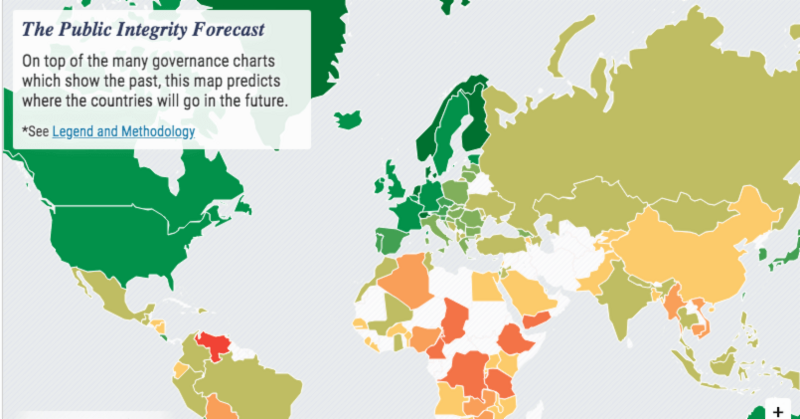
Interactive online map offers policymakers past and future indicators for 120 countries.
The European Research Centre for Anti-Corruption and State-Building (ERCAS), led by Hertie School Professor of Democracy Studies Alina Mungiu-Pippidi, has launched the Public Integrity Forecast, an online interactive map aimed at forecasting governance trends in more than 120 countries. Policymakers, donors, civil society members and others can use the map to help assess if and where anti-corruption measures may be needed.
The online map, which is the the result of a pilot project funded by National Endowment for Democracy, analyses ten years of indicators that ERCAS has developed with EU research funds. These include the index for public integrity (www.integrity-index.org), the public accountability tools repository (www.europam.eu) and a survey of recent political contingencies. The collaborative site also relies on crowdsourcing information by inviting comments and submissions from civil society and policy experts from around the world. The country legend and the full methodology can be viewed on the ERCAS website.
The dynamic tool provides not only a historical assessment, but also a future outlook, providing policymakers, donors or NGOs with knowledge for rapid action in implementing anti-corruption measures. The tool’s rating system provides an overview of why a certain country has fallen – or risen – along the indicator and specifies a few recommendations for each jurisdiction on measures to improve their control of corruption.
The aim is to identify countries that could benefit from increased international support for local stakeholders so that they can step over the threshold between corruption as norm and corruption as exception. As part of the launch of the Public Integrity Forecast, ERCAS will cooperate with the Center for International Enterprise (CIPE) to produce a series of podcasts and video tutorials on how to build context-tailored, evidence-based governance strategies.
More about Alina Mungiu-Pippidi
-
Alina Mungiu-Pippidi, Professor of Democracy Studies
